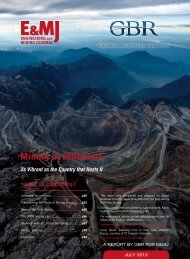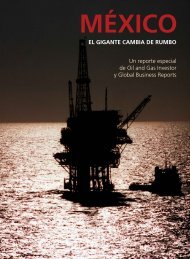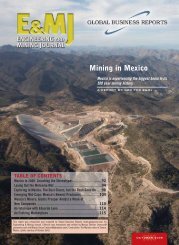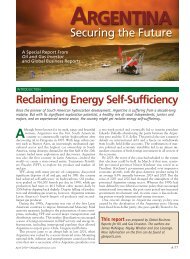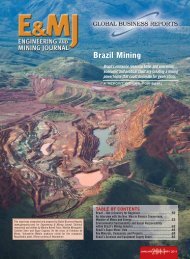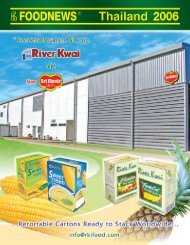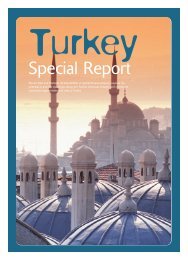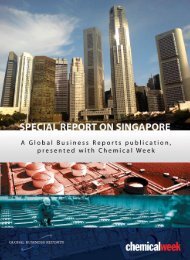Turkey Chemicals 2005 - GBR
Turkey Chemicals 2005 - GBR
Turkey Chemicals 2005 - GBR
Create successful ePaper yourself
Turn your PDF publications into a flip-book with our unique Google optimized e-Paper software.
COUNTRY FOCUS: TURKEY<br />
whatever the amount, and it has to depend on a good<br />
transportation system.<br />
In <strong>Turkey</strong>, almost all customers in need of overland transportation,<br />
use trucks as <strong>Turkey</strong> lacks a sufficiently developed<br />
railway network to enable a good transportation of<br />
commodity chemicals. In addition, last July, two deadly<br />
train crashes in the northwest of the country killed 37 people<br />
and injured 81. These terrible accidents reminded<br />
everybody that the railway network is not only underdeveloped<br />
but is also potentially dangerous.This situation has<br />
made <strong>Turkey</strong> one of the countries with the largest truck<br />
fleet in Europe. Alisan group, an international transport<br />
company based in Gebze, owns a fleet of almost 200<br />
trucks, including 19 liquid chemical carriers and transports<br />
its customer’s products throughout <strong>Turkey</strong> and all over<br />
Europe. 60% of their activity comes from carrying chemical<br />
products. Mrs. Damla Alisan, one of the founder’s<br />
daughters and GM of the company, sums up: “Chemical<br />
companies have no other choice than using trucks.We are<br />
there to create added value and to transport their products<br />
with all the safety required. Despite the competition, the<br />
prices of these services are still quite high” Fuel costs are<br />
currently double those in the States.What’s more, the conditions<br />
of the roads, especially in the countryside, have to<br />
be dramatically improved.<br />
However, despite these difficulties, the logistics market is<br />
well organized by local players, who have learnt year after<br />
year, to adapt to the specific conditions existing in <strong>Turkey</strong>.<br />
The arrival of big foreign competitors into this tempting<br />
market (like the German Brenntag, who is expected to make<br />
a significant move on the Turkish market early <strong>2005</strong>) will be<br />
a new challenge for these well implanted companies.<br />
Paint: bright delight<br />
If one segment of the chemical industry in <strong>Turkey</strong> were<br />
to be singled out for a promising future, it would have<br />
to be the paint industry. Two elements under pin the<br />
growth of a sub-sector that today accounts for 4.3% of the<br />
Turkish chemical industry’s overall sales.<br />
The first element is the rise of a large Turkish middleclass,<br />
fueling consumer spending and boosting paint consumption.The<br />
shift towards decorative paint from an industrial<br />
coatings-dominated paint industry is pronounced and<br />
most manufacturers are now concentrating on this segment.<br />
Levels of competition have soared, especially due to the<br />
presence at the heart of the Turkish market of a cottage<br />
paint industry selling low quality, low priced products.<br />
Product differentiation is therefore a relatively easy exercise,<br />
but educating consumers to increase their spending habits<br />
for paint items after years of belt tightening due to economic<br />
crisis has been a costly marketing exercise for all<br />
local Turkish paint makers.<br />
<strong>Turkey</strong>’s per capita paint consumption is still very low, at<br />
4-5 kg per year versus levels of 18-20 kg/yr in developed<br />
countries.Yet with growth rates for paint consumption at<br />
10% annually since 1988 and an estimated 12% annual<br />
growth over the last few years the sector has become an<br />
52<br />
November 24, 2004<br />
A Global Business Reports Publication,presented with Chemical Week



